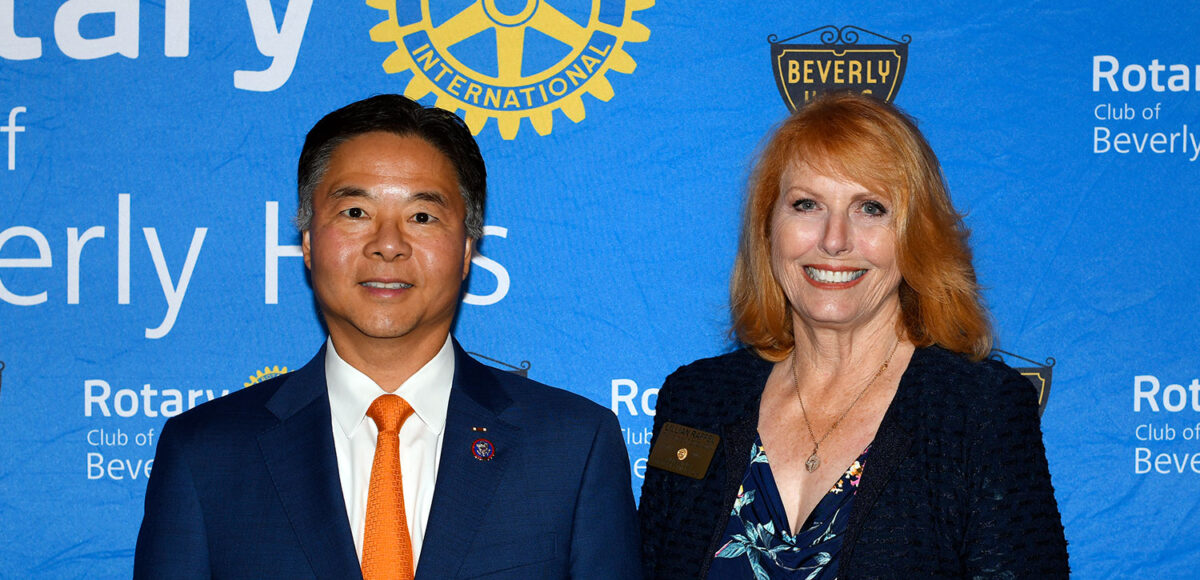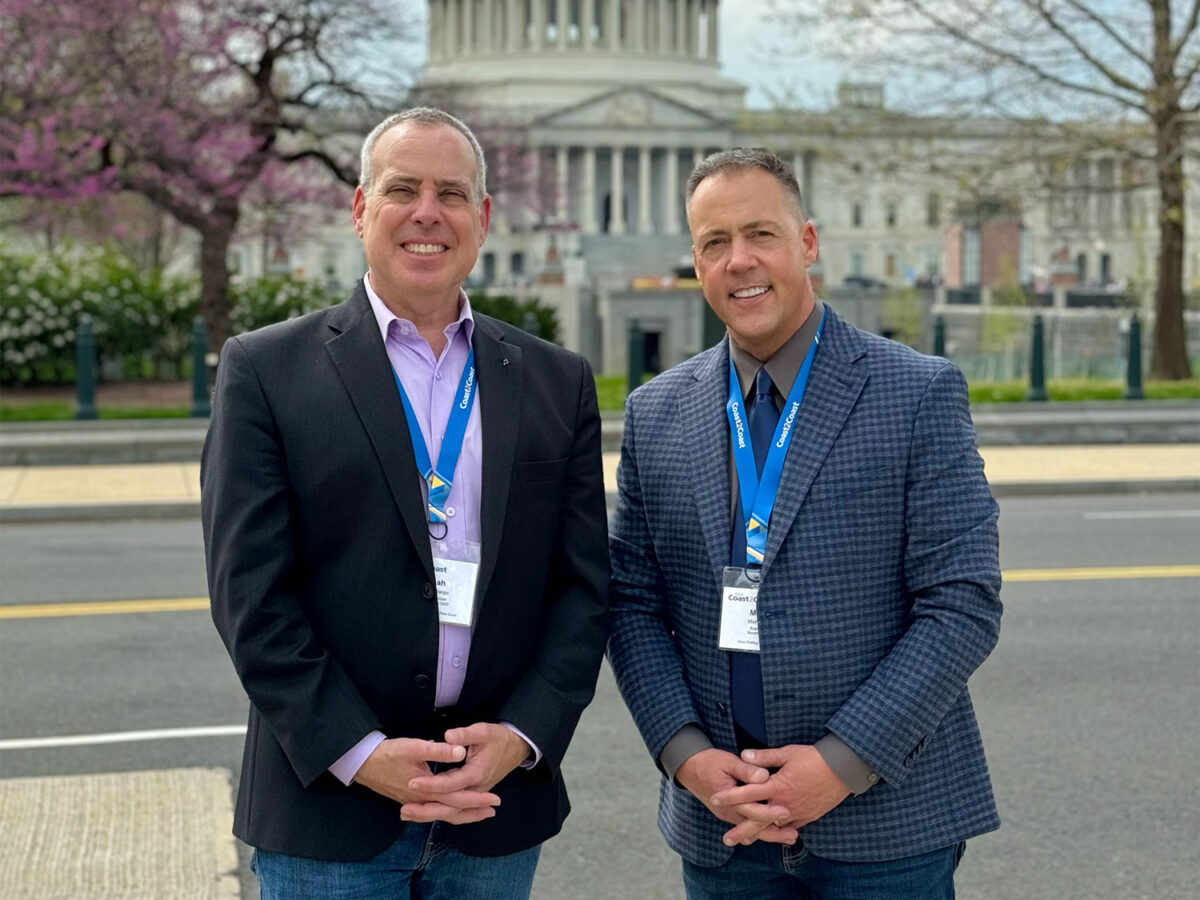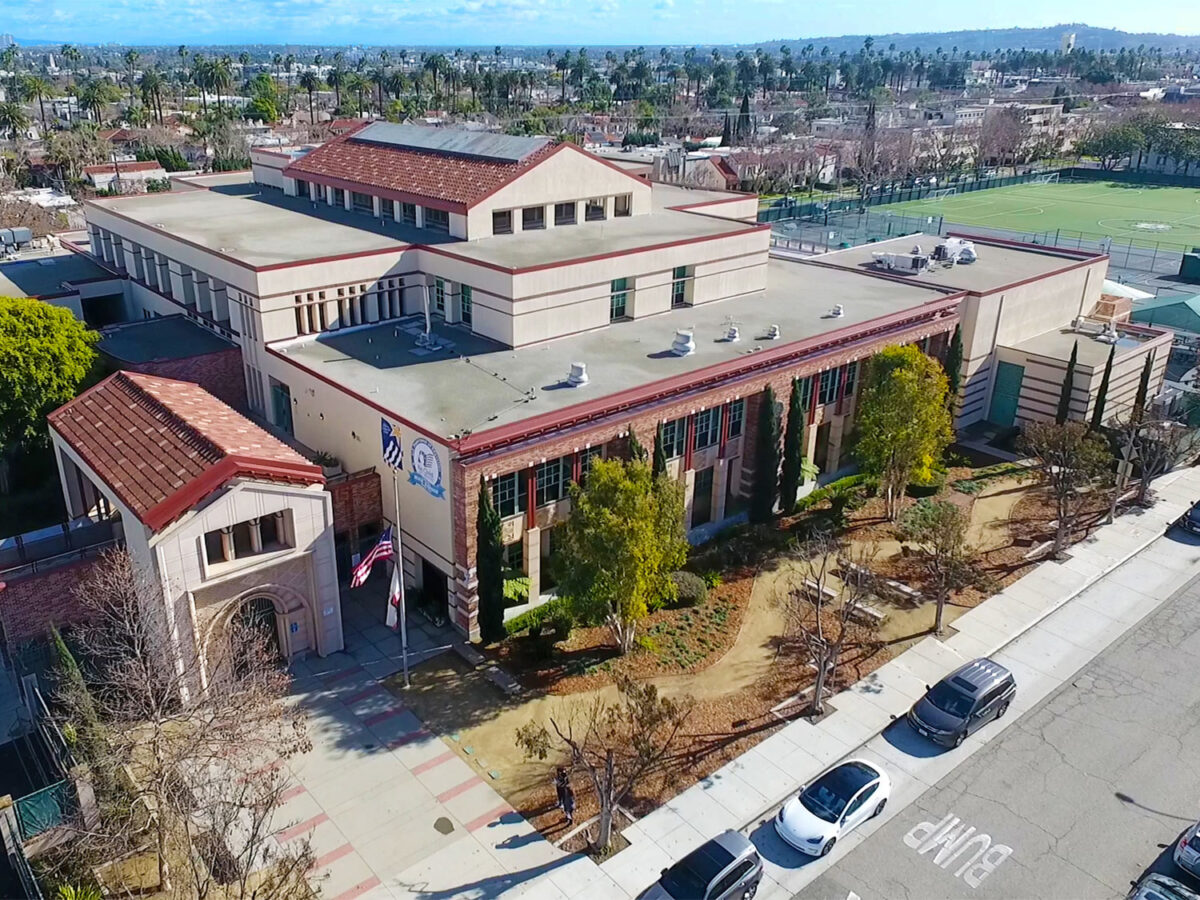Generative artificial intelligence (AI) is here and can’t be stopped. But it can be regulated by good old-fashioned human intelligence and Rep. Ted Lieu (D-CA-36th District) is leading the charge to do so.
Lieu made that pronouncement during a wide-ranging and engaging address to the Rotary Club of Beverly Hills on Aug. 14.
Lieu, whose South Bay/Westside district includes Beverly Hills, is best known on the national stage as an outspoken member of the House Judiciary Committee. He served as an impeachment manager for the second impeachment of President Trump. He is a vocal advocate for a number of issues, including climate change, civil liberties, veterans’ rights, consumer safety and privacy, LGBTQ-plus rights and cyber security protections.
In addition to the Judiciary Committee, Lieu is a member of the important Foreign Affairs Committee and the Science, Space, and Technology Committee. This year, he was elected as Vice President of the Democratic Caucus, making him the highest-ranking Asian American to have ever served in House leadership.
Born in Taiwan, Lieu immigrated to the United States with his family at the age of 3.
He graduated from Stanford University with a computer science degree. He went on to earn a J.D. from Georgetown University, where he was editor-in-chief of the Georgetown Law Review.
In her introductory remarks, Rotary Club President Lillian Raffel also recognized Lieu’s four years of active duty in the United States Air Force JAG Corps followed by the Air Force Reserves. He retired in 2021 with the rank of colonel.
Lieu’s opening remarks drew chuckles, albeit dampened by the somber realities of political affairs.
“Let me first say what a thrill it is to now stand in front of a normal, rational audience,” said Lieu.
Before delving into the headline topic of AI, Lieu rattled off a list of legislative accomplishments of the last term. At the forefront is the post-pandemic American Rescue Plan, which funneled nearly $11 million to Beverly Hills and its school district. “Under the Plan, over 10 million jobs were created in the first 15 months of the Biden-Harris administration, the most in U.S. history. That number is now over 13 million,” Lieu noted.
The bipartisan infrastructure law followed, with the mission to rebuild roads, bridges and highways. The PACT Act is helping veterans get the benefits they deserve from being exposed to toxins. The CHIPS and Science Act is bringing back high-tech chip manufacturing to the United States, and the Inflation Reduction Act is working to reduce the deficit and fund climate-change projects.
“Another thing we did last term is we authorized members of Congress to seek out and get funding for 10 to 15 community-funded projects. I was proud to have secured over $1 million for medical equipment at Cedars-Sinai Hospital,” said Lieu.
The Congressman then gave a status report of the term that began in January, when Republicans took control of the U.S. House.
Lieu’s signature style of delivering a body blow via understatement kicked in again.
“I’m just going to be descriptive as to what they’ve done. They held three hearings on gas stoves. They held two hearings complaining about Twitter and one hearing on UFOs.”
He added, “Republicans have been very late in passing appropriation bills. We need to pass 12 to fund government. They’ve managed to pass one. Money runs out end of September. When I come back after August recess, we’ll have 12 legislative days to pass the remaining appropriations bills. If that does not happen, the government shuts down. And this is following what happened earlier this year when we wanted to prevent defaulting on America’s debts. So that’s where we are in Congress. As a member of the leadership of the Democratic Caucus, we’re just trying to stop stupid stuff.”
An AI Wake-Up Call
Lieu then delved into the topic of artificial intelligence, from sweeping potential benefits to catastrophic potential misuses. In doing so, he made convincing arguments about the need for more oversight, which he has proposed in the form of a national commission on AI to advise Congress.
“As a recovering computer science major, I am enthralled with AI. It has changed our lives. It will change our lives. And what we saw this year, actually late last year, was a qualitative leap in AI technology. Prior to this, we already had AI in the form of what’s called deep learning. And so essentially you feed this AI algorithm a million pictures of cats. After a while, it’ll figure out what’s a cat and what’s not a cat. And that kind of deep learning technology has been used all over the place. It allows you to navigate on your GPS. It allows banking systems to prevent credit card fraud. It helps our national security, in terms of preventing foreign threats,” said Lieu.
He contrasted deep learning with the qualitative leap to what is called generative AI.
“Now, you say cat, and the AI algorithm writes a whole essay on the history of cats for you. It will generate 27 images of cats. It’s called ChatGPT. I encourage all of you to use it if you haven’t done it yet. It is free. Or use Microsoft’s Bing, which is similar technology, or Google’s Bard. They all do roughly the same thing, and it generates content.”
Lieu then turned to the obvious disruption to educational systems now that students can use AI to write essays. Job markets and other fields are also being transformed by the use of AI.
“You’re not going to be able to stop it. It is here. It’s going to keep on advancing,” he said.
Lieu cautioned that AI can also cause harm.
From his lawmaker’s perspective, Lieu sees AI in terms of three “buckets” of technology. The first and most extreme is “AI that can destroy the world.” In the case of the automated weapons used by the Department of Defense, Lieu has introduced bipartisan legislation providing that AI will never be able to launch a nuclear weapon by itself.
“There always has to be a human in the loop,” said Lieu.
The second “bucket” Lieu described is AI that will not necessarily destroy the world but can kill an individual.
“There’s a lot of AI in moving objects, planes, trains, automobiles. When the AI in a car malfunctions in automated driving mode, it will kill people. It has killed people. So, my view is, we need to have more regulators at all these agencies that are more attuned to these unique aspects of AI.”
Lieu added that the last “bucket” is hardest to deal with, because it is AI that harms society.
He cited the example of AI incorporated into hiring decisions that inadvertently discriminates against certain classes of people.
“Facial recognition technology is really amazing. It is useful in a number of functions. It also discriminates against people with darker skin. It’s less accurate. And so, my view is, if you deploy this nationwide, it’s a huge equal protection violation, because minorities will be misidentified at higher rates,” said Lieu, who has introduced legislation to put guardrails on facial recognition technology.
He ended his remarks with a call to action for a national commission on AI to advise Congress.
“I’ve created a piece of legislation that is going to set forth a bipartisan AI commission that’s going to have 20 people selected by the president and the four legislative leaders that would make recommendations to Congress on how to regulate AI. And it is based upon prior precedent. In the military side, we have an AI commission that gave recommendations to our Department of Defense on how to go forward with AI,” he said.
And with that, Lieu turned to audience questions that touched upon the topics of satellites and space and the use of AI therein.
One question brought up self-driving cars, which Lieu cautiously supports.
“We’re not quite there yet. I think there’s a lot of kinks that have to be worked out. I think we need more regulations, but that is the future,” he said.
Former Rotary Club President Charles Black even used AI to generate a question for Lieu regarding the need to regulate AI without stifling innovation in the private sector.
The AI-generated question garnered fair marks from Lieu, and this measured response:
“So that’s why I’m proposing this national AI commission, to make recommendations on exactly that question. Because it is a balance. You don’t want to stifle innovation in the United States, and you do want to prevent harm.”
Lieu concluded on the optimistic note that—at least on this topic—lawmakers are unified.
“The best way to think about AI is, it’s not a person, it’s not sentient. It’s a tool. And tools can be used for both good and bad purposes. And because it’s a tool, there’s no reason it’s partisan. In Congress, at least so far, there’s been bipartisan support.”






